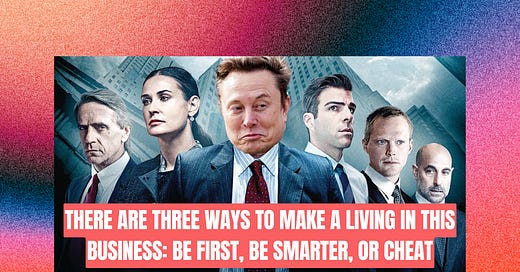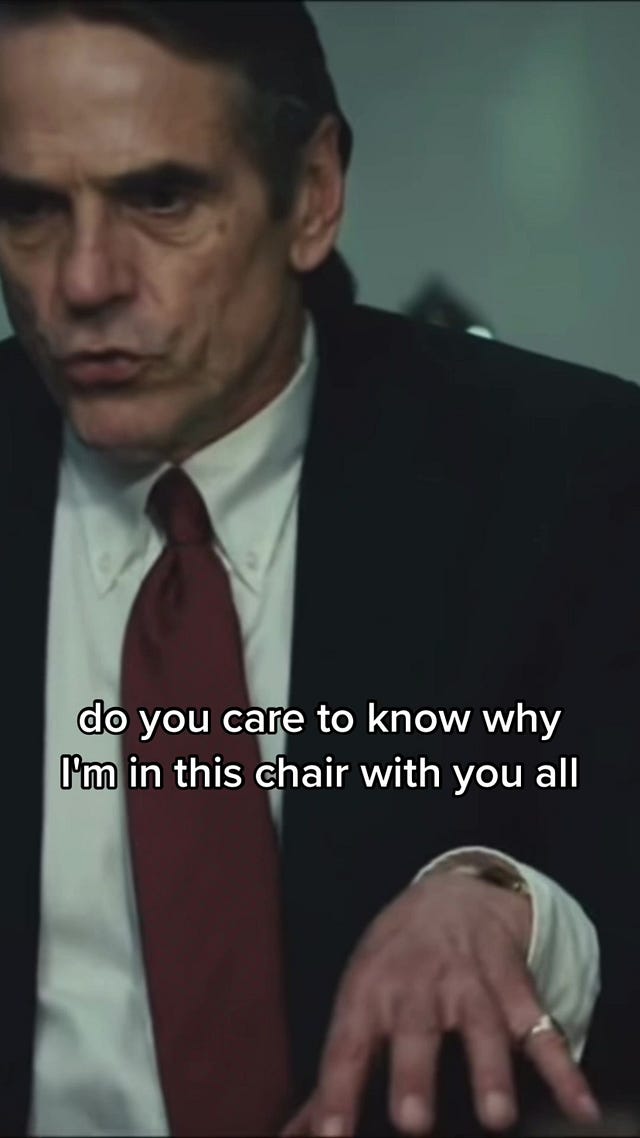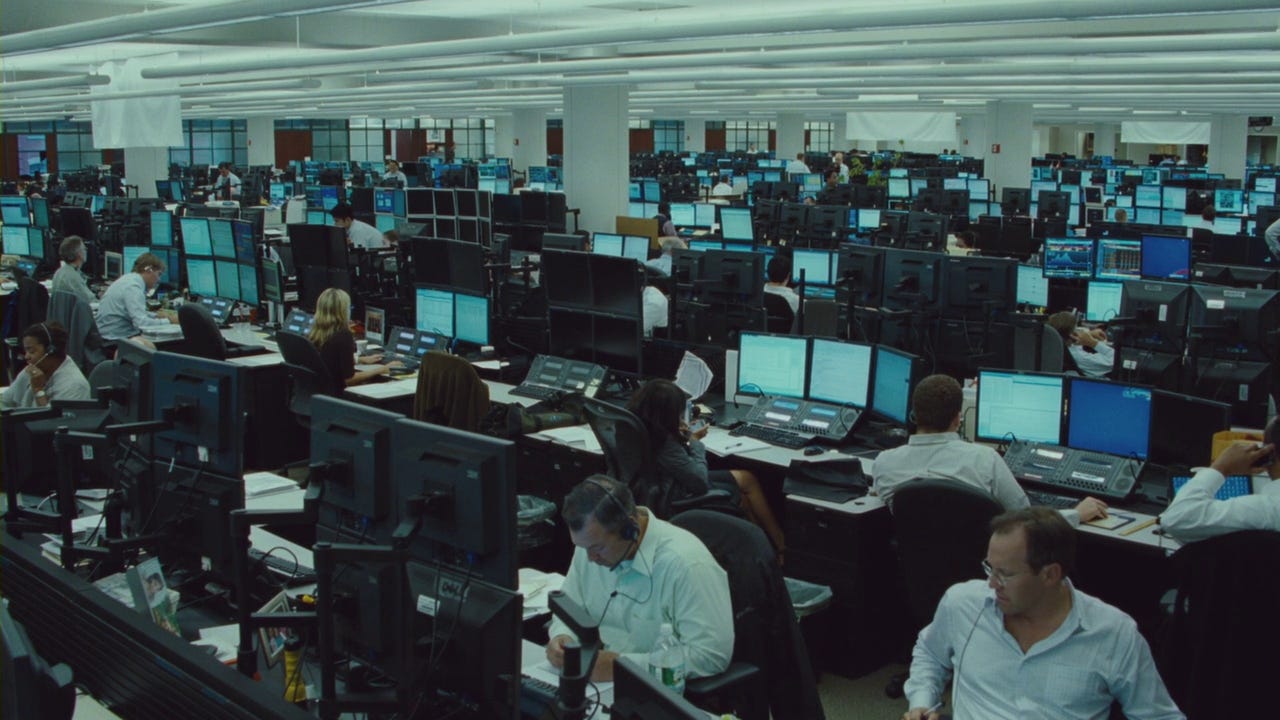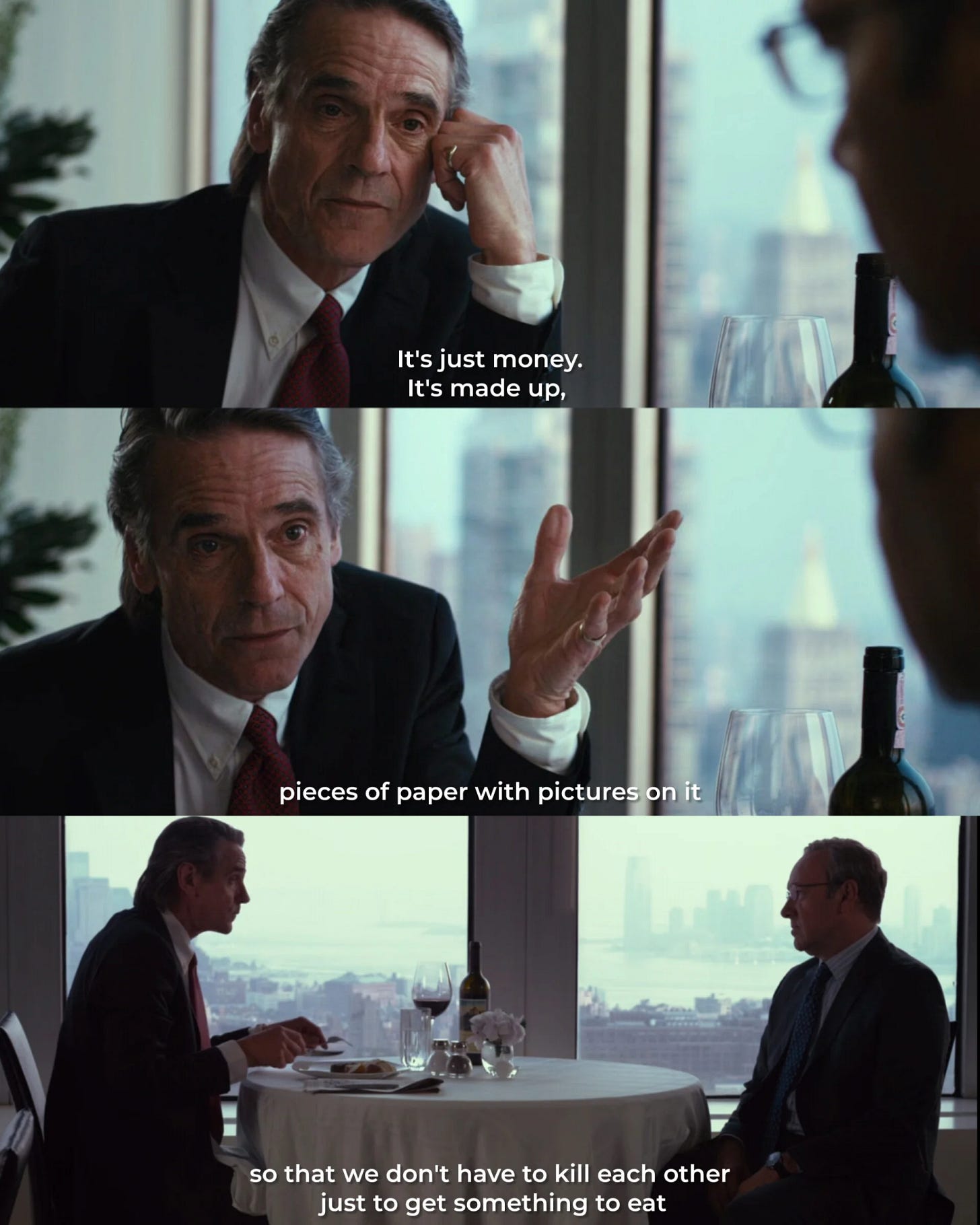what you're risking while watching elon musk risk tesla
When billionaires can't escape mathematical reality, we all learn what we've actually mortgaged.
Hey everyone, before we jump into things, I wanted to start with a huge thank you. The outpouring of support from all of you – my readers and the broader Substack community – after the news about The Guardian/The Observer situation has been overwhelming. Starting out on this independent writing path, it was honestly a bit of a gut punch, leaving me feeling pretty raw and disoriented. But you all stepped up in ways I couldn't have imagined, offering such great advice and even making me laugh when I really needed it. So, thank you.
I'm still trying to wrap my head around everything, including how I want to move forward with the newsletter. I'll be sharing more information about what’s been going on behind the scenes in the next edition of After Credits, which is where I get more personal with the patrons of That Final Scene.
I was fifteen when the 2008 financial crisis hit Athens. One week, life proceeded with Mediterranean predictability. The next, my dad was jobless, my mum's pension vanished, and ATMs would only dispense €60 a day, if they worked at all. I watched adults who thought they understood the world suddenly realize they didn't. Numbers in spreadsheets somewhere in Manhattan transformed into food we couldn't buy and plans we couldn't make.
This is why I rewatch Margin Call annually like checking an old wound. J.C. Chandor's film begins with layoffs, ends with dog burials, and spends its middle watching rich white men realize they've fucked the entire economy. It's bleak as hell but impossible to look away from.
If you haven't seen the film, the setup is simple: an investment bank discovers overnight their mortgage-backed securities are complete garbage. The risk models failed. Their assets are worthless. And their solution, naturally, is to dump every toxic asset before anyone else figures out the market is collapsing.
Somewhere in the film, Jeremy Irons delivers a line that should be tattooed on every business school graduate's forearm: "There are three ways to make a living in this business: be first, be smarter, or cheat."
Now, a dozen years after the film's release, we're witnessing Elon Musk barrel through all three strategies with the desperate energy of a man who just realized his pants are on fire. Tesla's stock is down 51%1 since December, sparking endless speculation about potential financial consequences.
For anyone who spent the last decade avoiding finance bros at parties, a margin call happens when you borrow money using stock as collateral, and that stock drops so low your lender essentially texts: "More money by tomorrow or we're selling your shit." Wall Street performs this kneecapping with DocuSigned paperwork instead of baseball bats, but the outcome feels identical to the recipient.
Musk built his empire on being first. Tesla would revolutionize cars like iPhone revolutionized phones. We'd all save the environment. We'd all celebrate his genius. For a minute there, it worked. Tesla once controlled 82.5% of the EV market while traditional automakers looked like Blockbuster execs dismissing this Netflix thing as a fad. Cut to February 2025: Tesla sales have nosedived 71% year-over-year in Australia and 76% in Germany. China – the market Musk once claimed would be Tesla's salvation – shows manufacturing output down 49%. Being first only matters if you keep running. Musk stopped to shitpost, and now the race is happening without him.
When being first failed him, Musk switched to being "smarter" (heavy quotation marks). He cultivated his techno-messiah persona – half Tony Stark, half that guy in your philosophy class who just discovered Ayn Rand. I've dated men like this. It never ends well. Well, this whole vibe let him wave away analysts questioning Tesla's 110-118 price-to-earnings ratio. Meanwhile his autonomous "robotaxis" have now become the forever-12-months-away promise. February 2023: "definitely next year." March 2024: "coming in 2025, swear to god." And when BYD started absolutely demolishing Tesla's market share in China, Musk just sneered they "make toy cars", right as those toys surpassed Tesla in global EV sales. Boy genius.
So after strategies one and two completely imploded, Musk decided to go option three: cheat your face off. His entire playbook reads exactly like the desperate Margin Call traders' final hours. Dump the garbage, buddy up with power, deny reality until you physically can't speak anymore. He's pumping Tesla stock with literal fake news, landed himself in Trump's Department of Government Efficiency (or DOG-E, as Kara Swisher calls it) to avoid getting his businesses investigated, and he’s suing to open dealerships in Wisconsin (this is against state law)2.
Nonetheless, financial gravity, which Musk dodged for years through overleveraging and pure vibes-based valuation, is finally catching up to him.
musk built a blame structure with only himself inside
Margin Call exists as that rare cinematic chimera - gothic horror masquerading as boardroom procedural. Kill the soundtrack and behold pure existential panic in bespoke suits. Some executives frantically calculate survival odds. Others quietly liquidate personal holdings. Then comes that odd subspecies of corporate fauna insisting the building remains structurally sound while their Italian loafers literally smolder.
Jeremy Irons' John Tuld arrives at 2 AM, when even cockroaches have gone to sleep. His helicopter descent feels demonic. Not in the hyperbolic internet sense, but in the ancient bargaining-for-souls tradition. I've only seen that specific facial expression, absolute calm amid catastrophe, on surgeons and sociopaths. His entrance exudes preternatural sangfroid, a reptilian composure perfected in mahogany-lined dining clubs. When confronted with numerical apocalypse, he exhibits neither denial nor bargaining, skipping directly to calculating adaptation.
"I'm here for one reason and one reason alone. I'm here to guess what the music might do a week, a month, a year from now," he declares. Tuld's a monster who eats people for breakfast, but at least he's a monster who passed 8th grade math. He makes decisions. He adapts to reality.
More impressively, he instantly activates the bank's immune system. He distributes culpability across organizational charts, quarantining Demi Moore's Sarah Robertson as the prophylactic sacrifice, transmogrifying moral catastrophe into atomized technical procedures requiring no individual ethical reckoning. When he initially demands to Zachary Quinto’s Peter Sullivan, "Explain this to me like I'm a child," he's creating legal and psychological distance from toxic details while maintaining decision authority.
This deliberate dumbing-down lets executives make catastrophic choices while preserving plausible deniability about technical specifics: risk managers grasp the math but lack trading permission, traders execute orders with partial context.
You can't be held accountable for aspects of collapse you were systematically prevented from fully understanding.
Musk's self-mythologizing has wrecked this protective barrier. His compulsive need to present himself as both visionary and technical expert, the guy who understands rocket trajectories, battery chemistry, manufacturing logistics, AI development, and market dynamics, demolishes the strategic information gaps that normally shield executives. He's engineered a financial structure with no diffusion mechanisms whatsoever. No wonder he's desperately trying to recruit DOGE headquarters as co-conspirators. He’s inadvertently created a system where blame flows directly and exclusively to him.
We saw this blame-absorption problem in real time during his Tesla all-hands on March 21. Musk showed up at 9:58 PM on a glitchy livestream asking, "If you read the news, it feels like armageddon. I can't walk past the TV without seeing a Tesla on fire. What's going on?" He asked this as though he wasn't the person who should be explaining it. UBS had already slashed Tesla delivery forecasts by 15% that day. A normal exec would have known this because their company would have prepped them. They would've had a risk department to blame, or market conditions to cite. Musk just had himself.
A week before that, Musk’s response to Tesla losing $18 billion in market value in a single day revealed the ultimate end state of failed blame diffusion: a Monty Python GIF of crucified prisoners singing "Always look on the bright side of life." Not production data, not a strategy update. In Margin Call, only the Peter Sullivans of the world make dark jokes because they've realized they're disposable. CEOs don't get that luxury. So when the boss starts tweeting crucifixion memes, you know the blame diffusion system has completely broken down.
wall street escapes by fracturing time, musk cannot
The film reveals another trick I find both horrifying and oddly impressive - how financial institutions manipulate time itself to escape accountability. The firm splits market collapse into separate time zones that never touch. The quants who built toxic models cashed bonuses years ago. Traders executing the fire sale will poof to other firms before consequences hit. Clients buying worthless assets won't connect their purchase to the catastrophe until months later. By morning, traders receive only sterilized commands, “Sell what you can", completely cut off from the midnight realization that everything's worthless.
I've always wondered how Wall Street executives sleep at night. After watching this film, I finally got it. They never experience the full arc of suffering they create. They inhabit a separate timeline – crisis management and bonus calculation – completely disconnected from foreclosure notices and emptied retirement accounts. They sleep just fine because in their timeline, the story ends with the morning bell. They order takeout, enjoy the meal, and then teleport away before the stomach pain hits.
This fracturing of time and responsibility gives financial institutions their escape velocity when markets collapse. Mortgage-backed securities whose origins became untraceable, while Musk has indeed pledged about 238.4 million shares3 as collateral for personal loans. Even Tesla's SEC filings acknowledge this with luscious corporate understatement, warning that forced sales "could cause our stock price to fall" (fancy talk for "death spiral").
The ripple effects look even scarier. Just as Margin Call shows how one firm's desperate moves spread damage throughout markets, a potential Musk margin call could trigger widespread chaos. Tesla makes up about 2.1% of the S&P 500, meaning individual investors holding index funds and ETFs would see their portfolios decline. Vanguard might manage those funds (with a reported $66 billion Tesla stake), but they're merely the custodian – it's everyday retirement accounts and investment portfolios that would feel the impact of any forced selling cascade. This points to the fundamental disconnect between Tesla's valuation and reality – a company valued more than the next seven automakers combined despite selling far fewer vehicles.
Wall Street analysts describe the scenario with barely hidden excitement: "Shorts would gang up on Tesla and try to drive it down to force the margin call. Now, they would have more ammunition because Elon would be in more dire straits". Such activist groups now exist indeed and they’re FURIOUS, honey.
So what happens if the market crashes? Well, our understanding of value crashes with it. Things we thought were solid turn to vapor. Things we dismissed as worthless suddenly mean everything.
The barista who makes your coffee. The neighbor who remembers your kid's name. The friend who calls to check if you need anything. These become the only stable currencies when the financial ones fail. Market collapses strip away appearances until only essentials remain. And what terrifies the wealthy about margin calls, is that they reveal who actually produces value and who merely extracts it.
If the margin call arrives – as it should if Tesla's stock price tanks – it will represent more than financial correction. It will reveal the man behind the facade. Not a visionary genius, not a planet-saving innovator, not a meme-lord culture warrior, not a woke virus exterminator but an overleveraged gambler who mistook bull market luck for brilliance.
market lessons written in coffee grounds saved twice
Margin Call's most haunting scene is its final. Kevin Spacey's Sam Rogers kneeling in suburban dirt at dawn, burying his dying dog while the sounds of ordinary life continue around him.
That’s the thing about financial collapse. It happens alongside ordinary life, invisible until it suddenly consumes everything.
Capital controls in Greece meant standing in ATM lines for hours to withdraw barely enough for groceries. The air smelled like cigarettes and fear. People spoke in whispers about markets and margins and liquidity - words that meant nothing to me until they meant everything. I saw my father, a proud man who never took charity, accept groceries from relatives with hands that wouldn't stop shaking. My mother saved coffee grounds to use twice. My grandmother started growing vegetables on her balcony. The invisible had become visible. Money, that thing we pretend exists only in the abstract, suddenly became brutally physical. Empty refrigerators, unpaid electric bills, neighbors who disappeared overnight.
I remember thinking, "Someone knows exactly who will bleed for this." Markets move like weather systems, but someone always decides who gets an umbrella. We call financial disasters "corrections" as if the universe simply balanced itself. But these corrections carve themselves into actual lives - first jobs lost, first homes foreclosed, first dreams deferred.
Still, I also shamefully see myself in that scene. You recognize it too, don't you? That split-screen existence where we condemn predatory capitalism over dinner while checking our investment portfolios for growth. Where we rage against environmental destruction while ordering next-day delivery. Where we demand accountability from others while designing lives that insulate us. Rogers burying his dog with genuine tears reveals our collective ability to feel authentic emotion in one sphere while causing devastation in another.
What kills me about Margin Call, and why I've probably watched it fifteen times now, is how perfectly it captures the gap between those who see reality and those who refuse to. Tuld delivers a devastating observation to Rogers during their final confrontation: "It's just money, it's made up, pieces of paper with pictures on them so we don't have to kill each other just to get something to eat." The fire sale ultimately devastated market stability and thousands of careers, but it preserved the institution.
I've watched enough market collapses to recognize the equation that never changes: power flows up, consequences flow down. What frightens me most this time around is how easily we'll adopt Tuld's dismissive "it's just money" philosophy—until we're the ones who can't make rent. The same people who celebrated Musk's ascension as proof the system rewards innovation will soon blame his victims for trusting him. When the dust settles, we'll all agree to forget the connection between billionaire fantasy and real-world consequence, just as we erased the faces of everyone who lost homes in 2008. We'll preserve the institutions while devastating lives, remaining complicit observers who tell ourselves we're nothing like the villains on screen.
I get it. We all build narratives about our immunity to consequences. We all find ways to disconnect our actions from their impacts. We all construct stories that cast us as exceptions to rules that govern everyone else.
But here's the truth we rarely admit: we're all one margin call away from discovering what matters.
Next time you check your portfolio, scroll past a fundraiser you could afford to support, or dismiss someone's hardship as their own fault, ask yourself: What music am I pretending will never stop? Whose dreams am I funding, and whose demise?What calculations am I avoiding? What responsibility am I diffusing? What lesson can I extract when the rockets fall back to earth?
Maybe it's this: Pay attention to what you've mortgaged. Not just financially, but emotionally and ethically. What parts of yourself have you pledged against future success? What values have you put up as collateral? What relationships have you leveraged?
I still believe in building things. I still believe in ambition and innovation and the wild possibilities of human creativity. But watching both Margin Call's fictional traders and Musk's very real meltdown has taught me to check my collateral calculations more vigilantly. To ask not just "What will I gain if this works?" but "Who will I become if this fails?".
Because when the music stops, when the markets close, when the algorithms finally deliver their verdict, we all end up in the same place: kneeling in the dirt at dawn, burying something we loved, facing what we once created.
A final note for people with taste 🫦
While the internet's prioritizing hot takes and SEO-optimized nothingness, I’m here building a sanctuary for people who believe film and television criticism can be thoughtful, accessible and fun all at once.
For the price of a truly mediocre sandwich, consider joining the resistance with a paid subscription – it keeps independent film writing alive and the algorithms at bay.
Plus, you'll get exclusive access to After Credits, my monthly handpicked selection of films & tv shows that will stop you from doomscrolling Netflix AND exclusive access to my more personal posts.
Now go forth and raise those standards, darling.
- Sophie x
Considering the Tesla situation is so volatile at the moment, I’m fully conscious some of these numbers may no longer be fully accurate by the time this issue comes out.
This incident was added in the essay within an hour of posting this piece.
Unlike what's been widely reported, Musk didn't use Tesla shares as collateral for the Twitter acquisition. While early plans included a $12.5 billion margin loan backed by Tesla stock, the final deal was structured differently - with funding from outside investors, direct loans to Twitter itself, and Musk selling Tesla shares outright.










This was incredibly powerful and magnificently threaded together. Lots to think about.
Indeed. I take some faint pride in that he never impressed me, and I never bought into any of his hype. I think the real problem here is the weirdly inverted value system of modern culture.